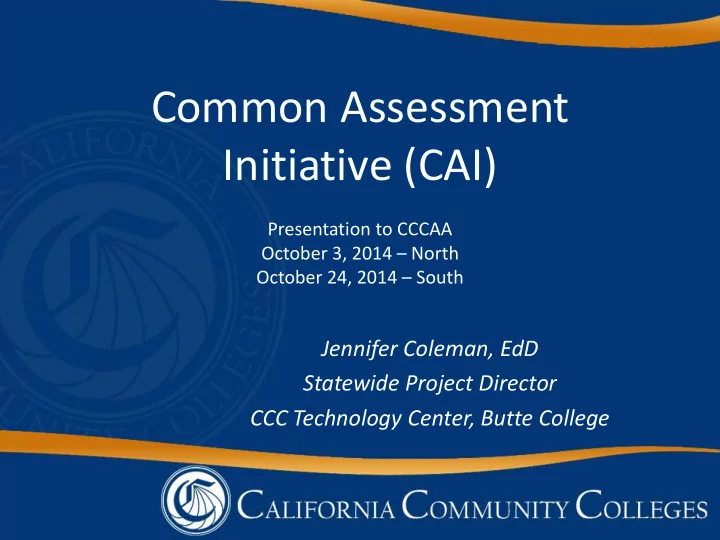

Common Assessment Initiative (CAI) Presentation to CCCAA October 3, 2014 – North October 24, 2014 – South Jennifer Coleman, EdD Statewide Project Director CCC Technology Center, Butte College
CAI Background • Grant awarded by CCCCO • 1 of 3 major grants funded in 2013-14 – Common Assessment Initiative (Butte) – Education Planning Initiative (Butte) – Online Education Initiative (Foothill/Butte) • CAI is mandated by Legislature – Tied to SSSP funding
CAI Overarching Goal • To develop a comprehensive, common assessment system that will: – align to state legislation – reduce unnecessary remediation – provide statewide efficiencies – effectively support faculty and staff to ensure accurate student placement, resulting in more successful student outcomes
Key Objectives • A test that covers curricular areas of – Math – English – English as a second language (ESL) • Multiple Measures (MMAP) • Assessment Preparation (EPI/OEI) • Professional Development • Integrate data across the system
Work to Date • Establish Governance – March 2014 – Stakeholder representation • Launch initiative project website – January 2014 – www.cccassess.org • Environmental scan – May 2014 • Pilot College Application and Selection – May 2014 • Request For Information (RFI) – June 2014 • Work Group formation and meetings – June 2014
Pilot College Applications • Robust pool of 35 colleges • Represent diversity in: – Student information systems – Current placement test use – Demographics – Geography and population density – Enrollment size
Pilot Colleges Selected • Bakersfield College • Fresno City College • Butte College • Rio Hondo College • Chaffey College • Sacramento City College • DeAnza College • Saddleback College • Delta College • Santa Monica College • Diablo Valley College • West Los Angeles College
Request for Information (RFI) • Follow-up to earlier RFI • Not comprehensive, update on innovations • Distributed to 35 vendors • Responses from 11 vendors • Exciting outcomes – New technologies and methodologies
Work Groups • Math • English • ESL • Multiple Measures • Professional Development • Test Development Process
Organization Chart * Steering Committee and Work Groups comprised of appointees representing ASCCC, Students, Assessment Professionals, IT, Research, Psychometricians, K-12, CSU/UC, Student Services, Other stakeholders.
Work Groups • Membership – Faculty • Appointed by ASCCC – Other stakeholders • Assessment experts, psychometricians, K-12 – Overlap/cross-pollination • Steering Committee • Pilot colleges • EPI, OEI
Next Steps • Collecting Feedback on Competency Maps – Through November 16 • Draft and Release of Request for Proposal (RFP) • Vendor review and selection • Pilot Phase • Launch and Implementation Phase • Support Phase • Professional Development
Request for Proposal (RFP) • Input from work groups • Thorough vetting – Question Pro • Prioritization of needs/wants • Vendor management – System determines needs, not vendor – Exit strategy
Pilot Phase • Two components – Test • Data collection and Validation – Technology/Platform • Student information system interface • Professional Development • Iterative process
Launch and Implementation • Pilot Colleges • Early adopters • External factors – Existing contracts – College resources • Ongoing support and continued validation
Professional Development • User types – IT/Software interface – Assessment Center staff – Faculty • Local control factors • Saddleback College as project lead • PD Advisory Committee over all three initiatives with ASCCC in lead role
Timeline • Fall 2014 – Work group content synthesis – Feedback and vetting - statewide and local channels – RFP Release • Spring 2015 – Vendor selection and contracting – Vendor communication and work – Additional feedback and vetting
Timeline • Fall 2015 – Pilot Phase – Feedback from the field – Development of resources for implementation • Spring 2016 – Release and Implementation – Ongoing feedback and development • Success!
Important Points • Common Assessment, not Common Placement • Opportunities for participation • Communication and feedback • Support for the work
Resources • www.cccassess.org • Stakeholder Group Representatives – Steering Committee – Work Groups
Questions? Thank you For the invitation and opportunity Presentation to CCCAA October 3 & 24, 2014
Recommend
More recommend